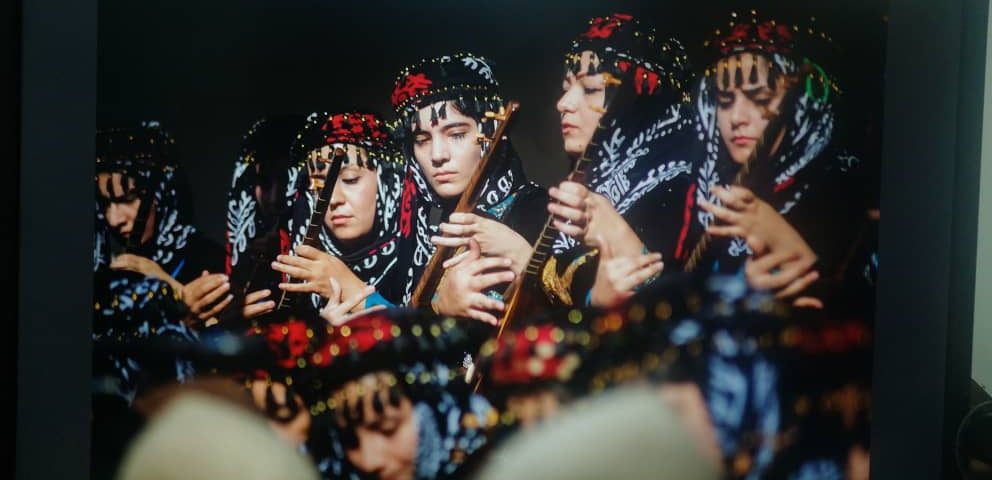Our Goals: Defending the Rights of the Yarsan Minority and Achieving National Reconciliation

Yarsanis women playing in a religious ceremony,credit:Behnaz Hosseini
The Yarsan faith, or Ahl-e Haqq, is a religious minority not recognized by the Constitution of the Islamic Republic of Iran. As a result, its followers face constant discrimination and harassment in Iran as many of them are forced to deny their faith in public. Some have even resisted the government’s de-identification by organizing cultural groups and publishing open letters to officials.
Seyed Amin Abbasi, a member of the Yarsan Civil Activists Advisory Council, told Mvoices: “The forced abandonment of faith by some Yarsanis has weakened their identity and promoted hypocrisy among them. Religious acceptance is no longer based on individual interest, desire, or awareness, but primarily aimed at obtaining a job and the basic necessities of life. It has created a dichotomy in them and consequently led to an identity crisis among the victims of discrimination.”
Over the past four decades, some religious minorities have engaged in various individual and group activities to preserve their identity and not give in to government repression. The Yarsan Civil Activists Advisory Council is one such institution.
“The Yarsan Civil Activists Advisory Council is a predominantly intellectual and – to some extent – socio-political movement that seeks to preserve the Yarsan identity, to defend the human rights of the Yarsani community, to resist injustice, and to achieve national reconciliation,” says Mr. Abbasi.
According to this Yarsan rights activist that “the council’s efforts have led to realizing, expanding, and recognizing some of the demands for the human rights of the Yarsani community in public. Apart from the aforementioned council, there are also some groups with cultural goals and objectives that are more active on the internet due to difficulties such as high expenses to perform activities in the form of a council and non-issuance of permission for ethnic and religious minorities in Iran.”
Many Yarsanis were dismissed or fired but did not submit to the authorities to deny their faith during the student and personnel selection processes. A few people have put pen to paper to withstand this cultural genocide and attempted to bring their community demands to the attention of the public by publishing open letters to officials and human rights organizations; they have also challenged the systematic boycott of the regime by resorting to socio-political participation within the framework of the circumstances as well as forming cultural groups specializing in playing the tambourine, reciting and chanting the Kalam (sacred hymns) in a group, and publishing the ritual texts.”Seyed Amin Abbasi, a member of the Yarsan Civil Activists Advisory Council
Mr. Abbasi added that, “initially, the resistance took an unorganized form through either forced migrations to large cities or other countries, especially Iraq, or through civil disobedience. Many Yarsanis were dismissed or fired but did not submit to the authorities to deny their faith during the student and personnel selection processes. A few people have put pen to paper to withstand this cultural genocide and attempted to bring their community demands to the attention of the public by publishing open letters to officials and human rights organizations; they have also challenged the systematic boycott of the regime by resorting to socio-political participation within the framework of the circumstances as well as forming cultural groups specializing in playing the tambourine, reciting and chanting the Kalam (sacred hymns) in a group, and publishing the ritual texts.
The self-immolation of three followers of the Yarsani religion, along with the series of protests that followed, marked a turning point in the history of Yarsanis’ resistance. These protests made the resistance public, passive, and organized, from which emerged the Yarsan Civil Activists Advisory Council and virtual groups with a demand-oriented approach. Of course, there are also examples of Yarsanis engaging in, and continue to engage in, secret activities (mainly abroad) in the form of opposition movements.”
The Yarsan population is estimated to be about 2 to 3 million who mostly live in the western Kurdish provinces, especially in Kermanshah. The faith also has followers in Iraq and Turkey.
According to Mr. Abbasi, “being Kurdish” has exposed a large group of Ahl-e Haqq to double religious and ethnic discrimination.
In recent years, the migration of the followers of this faith to Western countries and the use of the Internet have caused internal changes within this religious minority. Indeed, “Facebook has become a social place for Ahl-e Haqq who have been silent up until now.”
“Cyberspace at both the macro and the global levels has strengthened the Identitarian movement. It has helped with publicizing and growing Identitarianism, and – to some extent – creating a favorable environment for organizations in the Yarsani community, which has led to solidarity and a sense of belonging to one community among them. On the other hand, it has made the internal challenges and contradictions more naked and public,” adds Mr. Abbasi.
